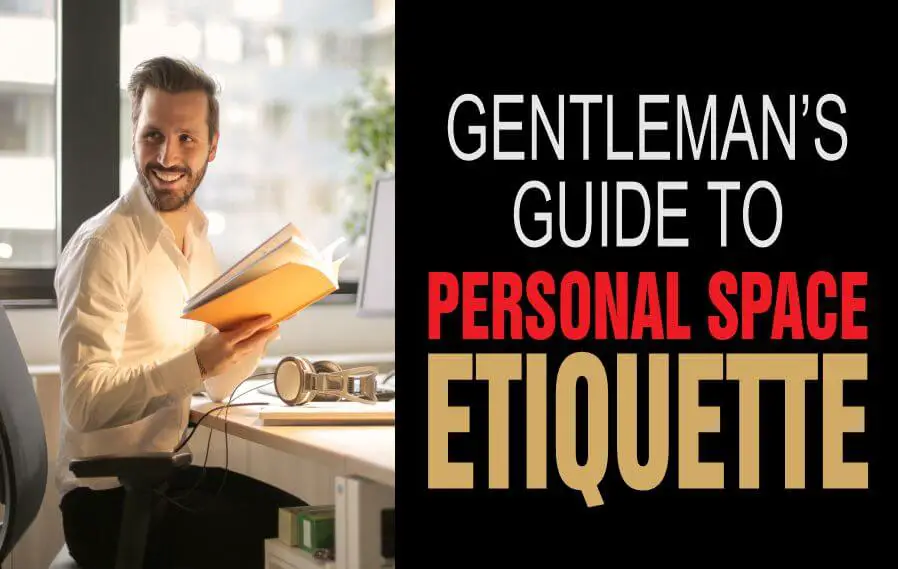Last updated on February 4th, 2025 at 06:52 pm
With bustling cities and crowded spaces, personal boundaries have become precious commodities needing personal space etiquette to keep things in control.
With the increased interactions, it is important to understand and respect personal boundaries, especially as a gentleman.
This is particularly significant when it comes to gentlemanly etiquette.
A gentleman’s guide to personal space etiquette as one of the gentleman’s etiquette is important for the true gentleman wherever he finds himself including the family, workplace, or with his circle of friends.
Let’s start by defining what persona space is actually.
Recommended: Gentleman’s Rules for Dating
What is Personal Space?

It is the area or limits an individual considers their own and within which they feel comfortable and secure.
It is made up of the physical, emotional, and psychological boundaries that you maintain to protect your personal privacy.
It is safe to say your privacy preferences are intact when you have control over your immediate surroundings and privacy.
The extent of this space can change depending on cultural norms, individual inclinations, and the dynamics of the relationship between people.
What is Personal Space Etiquette?
A gentleman’s personal space etiquette entails respecting physical, emotional, and psychological boundaries by adapting proximity to settings and relationships.
Emotionally, he practices attentive listening without prying or pushing further into what others are not ready to reveal.
Such balance and sensitivity in interactions cultivate an environment of respect and consideration, conveying actual gentlemanly behaviour.
Recommended: How to Use Cell Phone Like a Gentleman
Why is Personal Space Etiquette Important?

Personal space etiquette is important for everyone, regardless of their gender, as it helps establish boundaries, maintain privacy, and ensure comfort in social interactions.
However, there are a few reasons why personal boundaries may be particularly important for gentlemen:
Respect for autonomy: Having personal boundaries allows people, including gentlemen to have control over their bodies and establish their personal boundaries. Respecting personal space displays respect for their autonomy and individuality.
Emotional well-being: Everyone needs space and privacy to think, introspect, and process their emotions. Granting this space to a gentleman allows him the opportunity to unwind, reflect, and rejuvenate, which can positively impact his emotional well-being.
Gender norms and stereotypes: In some cultures, there may be certain gender-specific expectations and pressures on modern gentlemen, such as being assertive and masculine. Personal boundaries can provide them with a chance to escape these stereotypes and freely express their emotions, vulnerabilities, and individuality.
Avoiding discomfort and anxiety: Invading someone’s comfort zone can make them feel uncomfortable, anxious, or even threatened. Respecting the comfort zone of others ensures that a gentleman feels safe and at ease in social situations.
Promoting healthy relationships: Respecting individual spaces is essential for building and maintaining healthy relationships. By allowing each person their individual space, gentlemen can establish trust, communicate their needs effectively, and sustain mutually respectful and fulfilling relationships.
Personal space etiquette is fundamental for the gentleman’s well-being. It is a key aspect of respecting other people’s autonomy and his own for everyone’s emotional well-being, and promoting healthy social interactions, free from discomfort or anxiety.
Related: How to Shake Hands Like a Gentleman
Related: Driving Etiquette for the Gentleman
Personal Space Boundaries
The basics of personal space boundaries for the gentleman hinge on two basic factors – respecting physical and emotional boundaries.
Let’s take a look….
Physical Boundaries
Physical boundaries are the spatial limits that individuals establish to protect their personal space and ensure their physical well-being.
These boundaries define the permitted proximity and touching range, indicating the acceptable distance between individuals.
Physical boundaries can be both tangible and intangible, involving the delineation of personal property and personal space, as well as the recognition and enforcement of personal limits and boundaries in relationships.
As described above, they vary across cultures and individuals, reflecting personal comfort levels, privacy needs, and cultural norms.
A gentleman’s physical boundary varies depending on the context and the relationship between individuals.
In casual settings like social gatherings, a comfortable distance is about 3 to 4 feet (1 to 1.2 meters).
In professional situations, around 4 to 6 feet (1.2 to 1.8 meters) is suitable. Intimate contexts, like close friendships, permit closer proximity, often within arm’s reach.
Also, respecting physical boundaries and comfort zones is crucial. People vary in preferred personal boundaries; some need more distance; others are comfortable up close.
Watch for non-verbal cues like body language to gauge comfort levels and adapt accordingly.
Emotional Boundaries
The value of empathetic listening without intruding cannot be overemphasized. When someone opens up about their emotions or shares personal experiences, it’s crucial to practice empathetic listening.
This involves actively listening, showing understanding, and supporting without prying or intruding into their personal space.
Avoid asking overly personal or intrusive questions unless the person explicitly invites further discussion.
Also, understanding emotional cues is key for the gentleman as individuals differ in their willingness to share feelings.
Related: How to Kiss a Hand Like a Gentleman
Identify signs of openness, like voluntary sharing or explicit interest in discussing emotions, as well as non-verbal hints such as body language.
Show respect by not prying if someone seems reserved or uneasy.
Generally, a gentleman’s personal space etiquette involves respecting physical and emotional boundaries by maintaining appropriate individual space boundaries in different contexts and being mindful of personal and emotional comfort zones.
Personal Space Examples

Here are some examples of personal boundaries in both physical and emotional personal proximities:
Physical Personal Space
- When someone stands too close to you in a crowded elevator, invading your personal physical space.
- When a stranger reaches out to touch your shoulder without your permission, invading your personal physical space.
- When someone sits right next to you on a nearly empty bus, invading your personal physical space.
Emotional Personal Space
- When a close friend continually asks personal questions that you do not feel comfortable answering, invading your emotional space.
- When a family member constantly criticizes your life choices and judges you, invading your emotional personal privacy.
- When a coworker repeatedly shares their personal problems with you, expecting you to offer advice and support, invading your emotional privacy.
Remember, these examples are general guidelines, and personal space preferences can vary from person to person.
It’s in good taste to be observant of non-verbal cues and respect the personal space boundaries and comfort levels of those around you.
Related: The Gentleman’s Way to Conduct a Toast
Common Mistakes to Avoid
Of course, there are mistakes in respecting people’s boundaries and those of the gentleman when navigating social and emotional spaces.
But a gentleman should pay attention so he can avoid these mistakes as a true gentleman and also keep others from violating his.
Let’s take a look…
Invading Personal Space Unintentionally
One common mistake to avoid in gentleman’s personal space etiquette is unintentionally invading someone’s privacy.
This can happen due to a lack of awareness or misjudgment of appropriate distances.
To avoid this mistake, it’s important to be mindful of the following:
Be mindful of non-verbal signals: Non-verbal indications, like bodily gestures and facial expressions, can offer significant insights into someone’s level of comfort. If you notice signs of discomfort, such as someone leaning away, crossing their arms, or displaying tense body language, it’s an indication that you may be invading their private space.
Respect personal boundaries: Everyone has different comfort levels when it comes to personal space. It’s crucial to respect these boundaries and not assume that everyone has the same preferences. Err on the side of caution and maintain a respectful distance until you have a better understanding of the other person’s comfort zone.
Ignoring Signals of Discomfort
Another mistake to avoid is ignoring signals of discomfort. It’s important to be attentive and responsive to the following signals:
Verbal cues: If someone directly expresses their discomfort or asks for more space, it’s essential to listen and respect their request. Disregarding their verbal cues can make them feel disrespected or disregarded.
Non-verbal cues: Non-verbal cues, such as someone stepping back, avoiding eye contact, or displaying tense body language, can indicate discomfort. Ignoring these signals and continuing to invade their privacy can make the other person feel uneasy or violated.
Related: How to Dine Like a Gentleman
By being aware of and responsive to signals of discomfort, you can demonstrate respect for personal boundaries and create a more comfortable and respectful environment for everyone involved.
After all, this is the fundamental principle of the true gentleman.
Remember, personal space etiquette is about being considerate and mindful of the boundaries of others, both physically and emotionally.
Gentleman’s Personal Space in Relationships
The gentleman’s individual space in relationships is the physical and emotional boundaries that individuals establish and maintain with their partners.
It is important to have personal boundaries within relationships to ensure a healthy balance of independence and to encourage individual growth.
Physically, a gentleman is entitled to his own private area, including his partner.
This ensures they have the freedom to engage in activities or spend time alone without feeling overcrowded or intruded upon.
Each person may have different thresholds for violation, and it can vary depending on factors such as culture, personality, and past experiences.
Emotionally, personal space boundaries in a relationship have to do with maintaining autonomy, privacy, and a sense of self within the relationship.
Benefits of Personal Boundary Etiquette in Relationships
- Firstly, it allows for individual growth and self-care.
- It enables each person to pursue their own interests, hobbies, and friendships, which contribute to their overall well-being. It prevents feelings of suffocation or codependency and gives individuals the freedom to maintain their own identities.
- Personal boundaries can prevent conflicts and build healthier communication within a relationship. Providing each other with privacy and not constantly invading each other’s personal boundaries can create a sense of trust and respect.
However, personal boundary etiquette should be balanced and in equilibrium with the need for intimacy and togetherness in a relationship.
As a true gentleman, it is in good taste to find a middle ground where both partners feel secure and have their space respected, while still maintaining a deep emotional connection.
Effective communication, understanding, and compromise are key to achieving this balance.
Also Read: Rules for Eye Contact for Gentlemen
Developing Personal Space Awareness
Developing personal space awareness is an important aspect of being a gentleman, as it demonstrates respect for the boundaries of others.
Here’s an explanation of how a gentleman can cultivate personal space awareness, along with insights into practicing self-awareness and empathy in social interactions:
Practicing self-awareness in Social Interactions
Mindfulness: As a true gentleman, being mindful of your own body language, gestures, and proximity to others is important. Pay attention to how you naturally interact with people and how your actions may affect their privacy.
Reflect on feedback: Be open to feedback from others regarding your personal space behaviour. If someone expresses discomfort or mentions feeling crowded, take it as an opportunity to reflect on your actions and make adjustments accordingly.
Observe others: Pay attention to how others interact with individual space. Notice their body language, facial expressions, and verbal cues to understand what makes them comfortable or uncomfortable.
Empathy and its Role in Understanding the Personal Space Boundary Needs
Put yourself in their shoes: Empathy involves understanding and sharing the feelings of others. Imagine yourself in their position and consider how you would feel if someone invaded your space.
This perspective can help you gauge appropriate boundaries.
Non-verbal cues: Pay attention to non-verbal cues such as body language, eye contact, and facial expressions. These cues can provide valuable insights into how comfortable or uncomfortable someone may be with their individual space.
Respect individual differences: Recognize that individual space preferences can vary among individuals and cultures. What may be considered acceptable in one context may not be in another. Respect these differences and adapt your behaviour accordingly.
By practicing self-awareness and empathy, a gentleman can develop boundary awareness, ensuring that interactions with others are respectful and comfortable for all parties involved.
Consequences of Lack of Personal Space Awareness
Lack of boundary awareness can have various consequences, both for the gentleman who lacks awareness and for those around him.
Here are some potential consequences:
- Discomfort and annoyance: Invading someone’s personal boundary can make them feel uncomfortable and annoyed. People have different comfort thresholds when it comes to a personal boundary, and when it is violated, it can lead to negative emotions and strained relationships.
- Social awkwardness: Individuals who lack personal space awareness may come across as socially awkward or unaware of social norms. This can make it difficult for them to build and maintain relationships, as others may perceive their behaviour as intrusive or disrespectful.
- Violation of boundaries: Individual space is an important aspect of setting boundaries. When someone consistently invades another person’s boundary, it can be seen as a violation of their boundaries. This can lead to feelings of resentment, anger, or even fear in the person whose space is being invaded.
- Conflict and aggression: In some cases, the lack of personal boundary awareness can escalate into conflicts or even aggression. When someone feels their boundary is being invaded, they may react defensively, leading to arguments or physical altercations.
- Negative impact on mental health: Constantly having one’s personal boundary invaded can have a negative impact on mental health. It can lead to increased stress, anxiety, and a sense of vulnerability. Over time, this can contribute to a decline in overall well-being and mental health.
- Professional consequences: Lack of personal space awareness can also have professional consequences. In a work setting, invading someone’s boundary can be seen as unprofessional and may damage professional relationships or hinder career advancement.
- Cultural misunderstandings: Personal boundary norms vary across cultures. A lack of awareness of these cultural differences can lead to misunderstandings and unintentional disrespect.
Conclusion
Mastering personal space etiquette is an essential aspect of being a gentleman in society.
Respecting the boundaries of others demonstrate your consideration and empathy towards fellow individuals.
Understanding the appropriate distance to maintain, both physically and mentally shows your awareness of personal boundaries which encourages a harmonious environment.
Also, being mindful of body language and non-verbal cues allows you to navigate social interactions with social grace and respect.
Ultimately, by adhering to personal space etiquette, you not only enhance your own reputation but also contribute to a more courteous and respectful society as a whole.
Frequently Asked Questions
What is an example of personal space etiquette?
Examples of personal space etiquette are giving a nod and keeping a reasonable distance when engaging in conversation, allowing comfort without intrusion.
What is acceptable personal space?
The distance that ensures comfort varies by culture but generally, it’s around 1.5 to 4 feet in casual interactions.
Why is it important to respect personal space?
Respecting personal space promotes comfort, reduces anxiety, and displays consideration for others’ boundaries, fostering positive interactions and relationships.
How do you handle personal space?
Be mindful of cues, maintain a comfortable distance, adapt to cultural norms, and apologize if accidentally invading space, showing sensitivity and respect.
References:
https://www.candacesmithetiquette.com/personal-space.html
Pyo Merez is a men’s lifestyle enthusiast and writer about the gentleman’s place and impact on society. Raised by a distinguished gentleman dad, he offers unique insights into how the mind of a gentleman works and how societal norms shape gentlemen’s identity and vice versa.
Through his insightful articles, Pyo taps into the depths of gentleman culture to provide perspectives on etiquette and manners in modern society.

